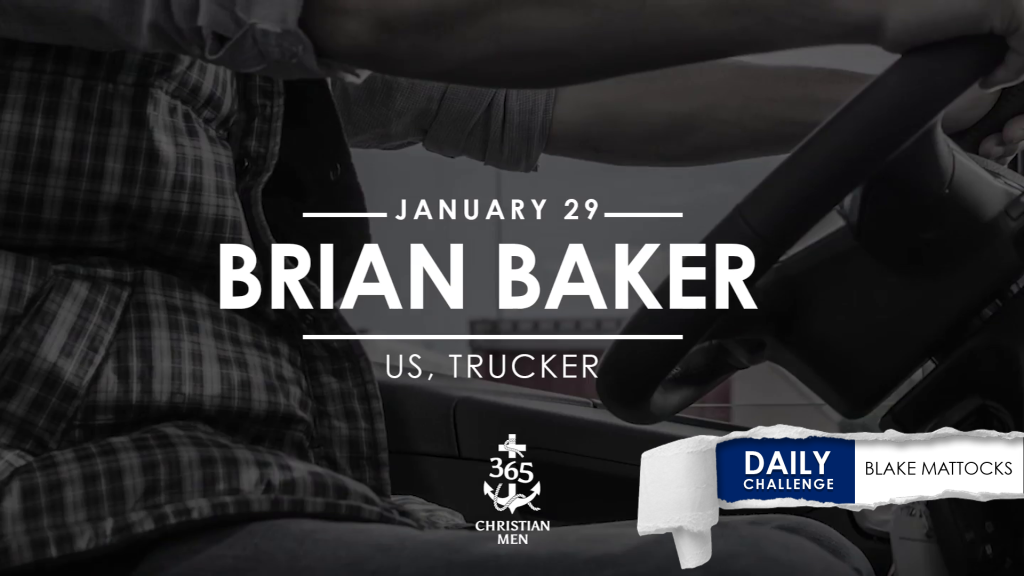January 29. Brian Baker. Brian is a truck driver, a family man, a man who—when he sees evil in the world—doesn’t hope somebody else will step up and do something about it.
In 1993, he traveled to Kenya, and seeing the need, built an elementary school for the village. It now serves 175 students, including 40 orphans. Since then he’s helped build 7 orphan projects and supported 3 schools and several safe houses. He has raised funds for more than 700 orphans and widows. On this date in 1996, Brian met Mother Teresa.
Brian’s ministry is named Kesitah International Missionaries; “kesitah” is a Hebrew word that means “it has value, but the value is no longer known.”
On his website, Brian writes, “Children that lose parents are helpless and seen as a burden to society. They are “throw-away” kids that live on the streets begging for scraps. But their Heavenly Father sees them as so much more. To Him, they have great value.”
You can’t right every injustice in the world. Start with one.
Brian clocked full-time hours as a trucker in Nebraska—and held down three more part-time jobs. But jobs were only a means to an end. Brian’s heart beat as a freedom-fighter.
He didn’t like a lot of talk, but believed in action. So, when he heard about human trafficking and slavery, he had to do something.
He researched and prayed about what to do. He told God he wanted to make a difference where others were not already working. He couldn’t do everything, but he could do something.
He attended a conference in Milwaukee and happened to room with Shamus, a Christian man from Pakistan, who told Brian about widows being abused as indentured servants. It was common in Pakistan and northern India.
When a common laborer needed medical care, he often borrowed money from the local rich man. If the debt was not paid and the laborer died, the man’s widow and children had to work off the debt. The lender took them into his home as housekeepers—where they were often sexually assaulted—or he sent them to local brick kilns.
Inside, the kilns were 170 degrees. Outside, roughly 120. The women worked next to the kilns in summer temperatures of 110 degrees. And they worked through snowy winters—14–16-hour days.
The “master” provided lodging and food. And charged for it. Within 6 months a debt of $600 could grow to $1400. And as long as there was debt, the widow and her children remained indentured. In some cases, 4 generations—families that had grown to 50 people or more—were enslaved.
It was a horrific story. But God had something up His all-powerful sleeve.
In that Milwaukee hotel room, Brian and Shamas made a plan. Brian would raise money to pay off debts and rehabilitate the widows. Shamas would carry-out the plan in Pakistan. Brian started a non-profit, Kesitah International Ministries. And Shamas sent Brian pictures and short bios of twelve indentured women.
Brian shared the stories of these women—in letters to friends and family and with the church.
That started in 2015. This week, Brian sent money to free another 6 women and their children, which—so far—makes 35 widows freed! Each woman learns to sew. With her new skills, she earns a monthly wage of $125-$150. Enough to support her family.
As these families were established, Brian and his wife saw another need: education for the widows’ children. So they started a school attended by seventy children, which includes Muslim children from the village.
Brian, Shamas, and their contacts are no longer the only ones fighting for the freedom of those indentured in that part of Pakistan. Last February, twenty-five of the freed widows pooled their money and purchased another widow’s—and her children’s—freedom.
Why does Brian fight for the freedom of people across the world when he already has a heaping-full plate providing for his family at home in the US?
“I like freedom,” Brian said. “I don’t like people telling me what to do. Slavery is the ultimate ‘telling me what to do’ lifestyle.”
“The Spirit of the LORD is upon me, for he has anointed me to bring Good News to the poor. He has sent me to proclaim that captives will be released, that the blind will see, that the oppressed will be set free” (Luke 4:18 NLT).
What bondage do you see in the lives of others—near or far? How can you fight for their freedom? You can’t right every injustice in the world. Start with one.
Based on an interview with Brian Baker on 10/14/2019.





